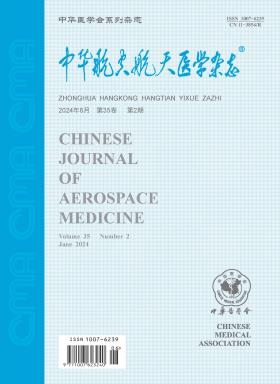飞行人员睡眠质量与情绪状态的研究
引用次数: 0
摘要
目的了解飞行人员的睡眠质量、情绪状态及其关系,为有针对性的航空医疗保障提供参考。方法采用匹兹堡睡眠质量指数(PSQI)、焦虑自评量表(SAS)、抑郁自评量表(SDS)和心境量表(POMS)对249名飞行人员进行匿名问卷调查。比较飞行人员、常务兵和普通士兵的睡眠质量。分析了睡眠质量与情绪状态的相关性。结果共回收问卷238份,有效率为95.6%。238名飞行人员睡眠障碍患病率为36.6%。他们的PSQI总分为(6.79±3.06)分,显著高于常模和普通士兵(t=14.706、5.967,P<0.01),焦虑、抑郁得分高于国内常模(t=4.867、3.147,P<0.01)。此外,随着PSQI总分的增加,SAS、SDS、紧张-焦虑、抑郁-沮丧、愤怒-敌意、疲劳-惰性和困惑-困惑得分呈上升趋势。但在剧烈运动方面的得分有所下降。相关分析显示,PSQI总分与SAS、SDS、紧张-焦虑、抑郁-沮丧、愤怒-敌意、疲劳-惰性、困惑-困惑得分呈正相关(r=0.549 ~ 0.665, P<0.01),与活力-活动得分呈负相关(r=-0.417, P<0.01)。结论睡眠质量是情绪状态的重要指标。飞行人员的睡眠质量低于常模和普通士兵,这意味着飞行人员处于明显更高的紧张和应激状态。关键词:睡眠;情绪;问卷调查;军事飞行人员本文章由计算机程序翻译,如有差异,请以英文原文为准。
Study on the sleep quality and emotional state of flying personnel
Objective
To investigate the sleep quality, emotional state and their relationship for flying personnel so as to provide reference for the targeted aeromedical support.
Methods
Two hundred and forty-nine flying personnel participated in the anonymous questionnaire surveys, including Pittsburgh sleep quality index (PSQI), self-evaluation of anxiety scale (SAS), self-rating depression scale (SDS), and profile of mood state (POMS). Comparisons of sleep quality among flying personnel, norm and ordinary soldiers were conducted. The correlation between sleep quality and emotional state was analyzed then.
Results
There were 238 questionnaires returned and the effective rate was 95.6%. The prevalence of sleeping disorders in 238 flying personnel was 36.6%. Their total score of PSQI was (6.79±3.06), which was significantly higher than that of norm and ordinary soldiers (t=14.706, 5.967, P<0.01) and their scores of anxiety and depression were higher than those of the domestic norm (t=4.867, 3.147, P<0.01). In addition, with the total score of PSQI increased the scores on SAS, SDS, tension-anxiety, depression-dejection, anger-hostility, fatigue-inertia and confusion-bewiderment showed upward trend. But the score on vigor-activity was decreased. Correlation analysis showed that the total score of PSQI was positively correlated with the scores on SAS, SDS, tension-anxiety, depression-dejection, anger-hostility, fatigue-inertia and confusion-bewiderment (r=0.549-0.665, P<0.01), and was negatively correlated with vigor-activity (r=-0.417, P<0.01).
Conclusions
Sleep quality is an important indicator of emotional state. Sleep quality of flying personnel is lower than that of norm and ordinary soldiers and this means the flying personnel are in obviously higher tension and stress state.
Key words:
Sleep; Emotions; Questionnaires; Military flying personnel
求助全文
通过发布文献求助,成功后即可免费获取论文全文。
去求助
来源期刊

中华航空航天医学杂志
航空航天医学
自引率
0.00%
发文量
2962
期刊介绍:
The aim of Chinese Journal of Aerospace Medicine is to combine theory and practice, improve and popularize, actively advocate a hundred flowers bloom and a hundred schools of thought contend, advocate seeking truth from facts, promote the development of the related disciplines of aerospace medicine and human efficiency, and promote the exchange and penetration of aerospace medicine and human efficiency with other biomedical and engineering specialties.
Topics of interest for Chinese Journal of Aerospace Medicine include:
-The content of the journal belongs to the discipline of special medicine and military medicine, with the characteristics of multidisciplinary synthesis and cross-penetration, and mainly reflected in the aerospace industry, aerospace flight safety and efficiency, as well as the synthesis of special medicine, preventive medicine, environmental medicine, psychology, etc.
-Military aeromedicine (Air Force, Navy and Army aeromedicine) and civil aeromedicine, with a balance of aerospace medicine are the strengths of the journal.
-The change in aerospace medicine from a focus on promoting physiological compensatory adaptations to enhancing human performance under extreme environmental conditions is what the journal is helping to promote.
-The expansion of manuscripts in high altitude medicine is also a special emphasis of the journal.
 求助内容:
求助内容: 应助结果提醒方式:
应助结果提醒方式:


